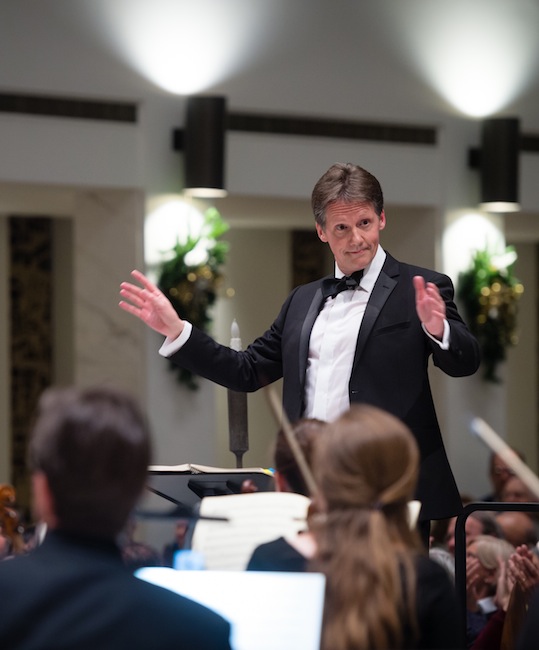Conductor Marsh makes admirable showing with Washington Bach Consort

Dana Marsh conducted the Washington Bach Consort in the “Christmas Oratorio” Saturday night. Photo: David Betts
Washington Bach Consort is searching for a new music director.
Starting last season with acting director Todd Fickley, this beloved local ensemble has been auditioning five candidates in concerts of major works by its namesake. The third conductor, Dana Marsh, had his turn on Saturday evening, with an abridged performance of the Christmas Oratorio (Parts I, II, V, and VI) at National Presbyterian Church.
Just as Handel did in Messiah, Bach adapted much of his own secular music in compiling this large work, six cantatas spread out over six feast days in the Leipzig Christmas season of 1734. The Consort’s sixteen singers sounded supremely confident in the opening chorus of Part I, the German diction—the ensemble’s pride and joy—crisp and articulate. All four parts came through the texture with clarion power, so that one could hear all the parts at important points.
While the singers responded to Marsh’s gestures with a unified sound, the orchestra was not as cohesive. Marsh had some difficulty, in this chorus and in other large sections, establishing a solid tempo, with orchestral ensemble issues in the introduction. The trumpets, in particular, seemed to rush ahead of Marsh’s downbeat, which was not always as clear as it could have been.
Yet by the time of the return of the opening material, the ensemble had established a groove and things went more smoothly. Timpanist Michelle Humphreys was rock solid providing the signature sound of this movement, originally for the secular cantata Tönet, ihr Pauken! Erschallet, Trompeten! (Resound, you drums! Ring out, you trumpets!).
Bach gave the oratorio’s best arias to his alto soloist, and mezzo-soprano Kristen Dubenion-Smith brought a maternal, comforting tone to this exquisite music. The highlight was “Schlafe, mein Liebster,” here a lullaby for the baby Jesus. Dubenion-Smith’s velvety legato and embracing warmth of sound combined ideally with the pale flauto traverso doubling her. The aria would have been finer still had Marsh brought the violins’ volume down to support the singer more discreetly. Marsh also had trouble establishing a clear tempo in Dubenion-Smith’s first aria, “Bereite dich, Zion,” where his singer chafed a bit against the dragging accompaniment.
Steven Combs gave an urbane interpretation to the bass solos, even in tone across his entire range, as in the ingenious commentary on the chorale “Er ist auf Erden,” sung by the ensemble’s flawless soprano section. He sang with admirable agility in the aria that followed, “Großer Herr und starker König.”
Soprano Kate Vetter Cain struggled with intonation issues on the top notes of “Nur ein Wink,” but made strong contributions elsewhere. The only soloist who did not also sing in the chorus was tenor Robert Petillo, fluid and authoritative in the Evangelist’s Gospel recitatives. His high range, precise and floating in quality, was well suited to the arias, too, as in “Frohe Hirten, eilt,” where he was supported by the extraordinary obbligato of traverso soloist Colin St-Martin.
Among the orchestra the four oboists deserve special mention, creating a rustic and delightfully pastoral sound in the second cantata, about the visit of the shepherds to the manger. In this piece Bach called for two oboes d’amore and two oboes da caccia, and the challenging low writing is rewarding when it is played as well as it was here. The string sections were in top form, although concertmaster Tatiana Chulochnikova sounded insecure on the violin obbligato in the trio aria “Ach, wenn wirt die Zeit erscheinen?”
The next conductor to audition for the Washington Bach Consort will be Matthew Dirst, conducting Bach’s St. John Passion 3 p.m. March 18, 2018. bachconsort.org








Posted Dec 10, 2017 at 9:21 pm by Laura Youens
I had not realized that this would be an abridged performance, and I’m sorry that they left out Part 4. Thanks for these perceptive comments.